UQ is investing in new health and medical research models and new capabilities to address our most pressing health and medical research and innovation challenges.
Transforming the health and wellbeing of societies requires a highly collaborative and interdisciplinary research approach. Through the Vice Chancellor's Health Research Accelerator (HERA) initiative, our researchers are augmenting the health and medical research capabilities of UQ and its partners and delivering collaborative solutions that amplify the impact on human health.
Our vision
Through the HERA initiative, we want to:
- catalyse interdisciplinary research programs nationally and internationally
- grow national and international funding with industry, partners, philanthropists, and
- grow industry partnerships for knowledge exchange to drive outcomes for transformative health and medical research impact of human health.
In doing this, we will help to address the major health challenges of our time.
Our research programs include:
Development of mRNA vaccines
This program will invest in critical expertise focused on mRNA technology, vaccine delivery, bacterial vaccine genomics and vaccine immunology, resulting in transformative mRNA vaccine development.
EvolveHealth Health Workforce Optimisation
Globally, healthcare systems are struggling through rising costs, critical staff shortages, increasing demand, more expensive technologies and the growing burden of chronic conditions are straining services and systems.
Our EvolveHealth program is redefining the future of work in Australia's healthcare sector.
Groups and Relationships to Optimise Wellbeing and Health (GROWTH)
Social isolation can affect anyone. It also places huge pressures on health services – estimates suggest that around 10 per cent of adults suffer from its debilitating consequences, and that GPs spend around 20 per cent of their time dealing with non-health problems.
GROWTH is pioneering a new community-focused approach to combating loneliness.
Operational Research and Decision Support for Prevention, Control and Elimination of Infectious Diseases (ODeSI)
Emerging infectious diseases (EIDs), vaccine preventable diseases (VPDs) and neglected tropical diseases (NTDs) are of international significance, especially in Asia-Pacific, and present many mutual challenges.
Our ODeSI program is enhancing the effectiveness of EID, NTD and VPD management in Australasia.
The University of Queensland's Clinical Trials Capability (ULTRA)
Randomised Controlled Trials (RCTs) are an important component of the healthcare system as they provide gold standard, robust evidence about the comparative effectiveness and cost-effectiveness of interventions. Evidence from RCTs transforms healthcare, shapes decisions about healthcare expenditure and improves the health of the population.
The ULTRA program is innovating the RCT lifecycle to improve result times and patient outcomes.
360 Kids Community Network
A quarter of Australian children are developmentally vulnerable at entry to school. The social, wellbeing, and developmental challenges they face increases their lifelong risks for poor health and academic outcomes. Without prevention or early intervention these children are at much greater risk for lifestyle-related chronic disease, health, social and educational challenges.
The 360 Kids Network is improving the life trajectory for vulnerable children.
Queensland Digital Health Centre (QDHeC)
Healthcare as it is currently delivered in Australia is not sustainable. Health systems are straining under rising costs, increasing demand and growing wait times. The Queensland Digital Health Centre will become the engine room of our digital healthcare future.
QDHeC is transforming digital healthcare for Queenslanders.
The Program of Research and Innovation involves 9 UQ facilities and institutes and over 115 researchers – making this a truly multi-disciplinary collaboration initiative.
UQ committed $50 million to the HERA Programs of Research and Innovation to recruit outstanding researchers with the knowledge, skills and expertise to augment the health and medical capabilities of UQ and its partners to deliver collaborative solutions that amplify the impact on human health.
Of the 28 positions earmarked as part of this funding, 33 outstanding researchers have now joined the HERA team.
EvolveHealth Workforce Optimisation
Associate Professor Jean Spinks
GROWTH
Development of mRNA vaccines
Operational Research and Decision Support for Prevention, Control and Elimination of Infectious Diseases
Associate Professor Benn Sartorius
Queensland Digital Health Centre
Associate Professor Bevan Koopman
The University of Queensland’s cLinical TRials cApability
Associate Professor Ingrid Hickman
360-Kids Network
The inaugural Through Our Eyes event took place at Brisbane Convention & Exhibition Centre on 8 - 9 October 2025. This inspirational gathering brought together diverse voices driving meaningful change for healthy communities across Queensland and beyond.
What made this event particularly special was the genuine collaboration visible among the 150+ attendees present each day. The event drew together community members, researchers, health service providers, and industry partners, all committed to co-designing initiatives that address real community needs.
Day One featured three panel discussions: Partner Voice, Provider Voice, and Community Voice, bringing together perspectives from industry partners, health service providers, and community members with lived experience. The afternoon showcased rapid-fire research presentations across HERA's seven programs, followed by a thought-provoking debate on AI's role in society.
Day Two opened with a keynote from Dr Nicholas Johnson, Executive Director of Research Partnerships at the National Health and Medical Research Council (NHMRC). Participants then moved into action-focused workshops on Infectious Disease Control and Prevention, Disability, Early Years, Future Workforce, and Partnering with Community. These intensive sessions moved beyond discussion into concrete planning, identifying priorities and developing frameworks for future collaboration.
The poster presentation session showcased innovative research from across the UQ research community. Three outstanding contributions were recognised:
- 1st Place: Ingrid Hickman – 'Bridging the Gap: Has Implementation Science reached the Clinical Trial Workforce? A National Needs Assessment of Training and Practice'
- 2nd Place: Quita Olsen – 'Worldwide willingness to share health data high but privacy, consent and transparency paramount, a meta-analysis'
- 3rd Place: Samantha Robertson – 'Selection and validation of a tool to measure digital health competence of clinicians'
The event would not have been possible without the community members who generously shared their wisdom and lived experience. Their voices are essential to creating lasting, meaningful change through research.
The inaugural Through Our Eyes has laid a strong foundation for ongoing collaboration and community-led change. The connections forged, ideas exchanged, and commitments made during these two days will continue to ripple outward, influencing research priorities, funding decisions, and partnership models.
We are grateful to every attendee who contributed their time, expertise, and lived experience to making Through Our Eyes 2025 a success. We look forward to continuing this important work together and welcoming you to future events where we will build on this momentum.
#PartneringForChange
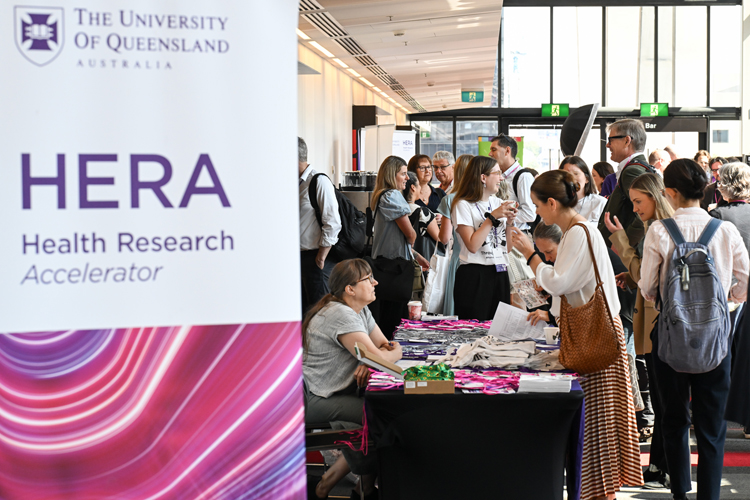

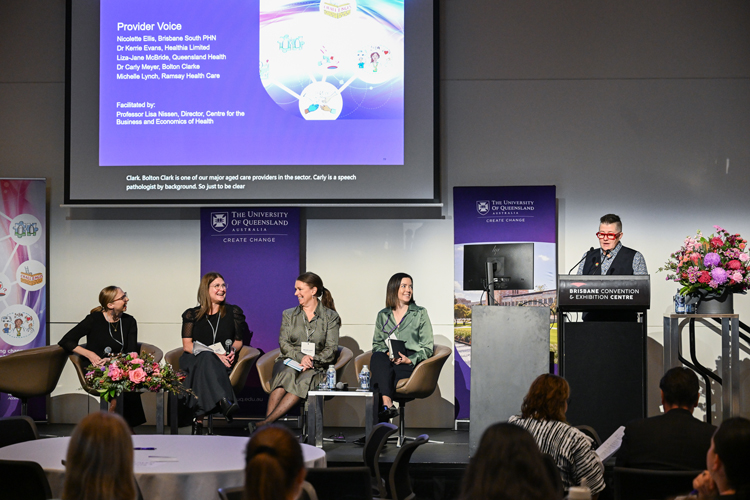


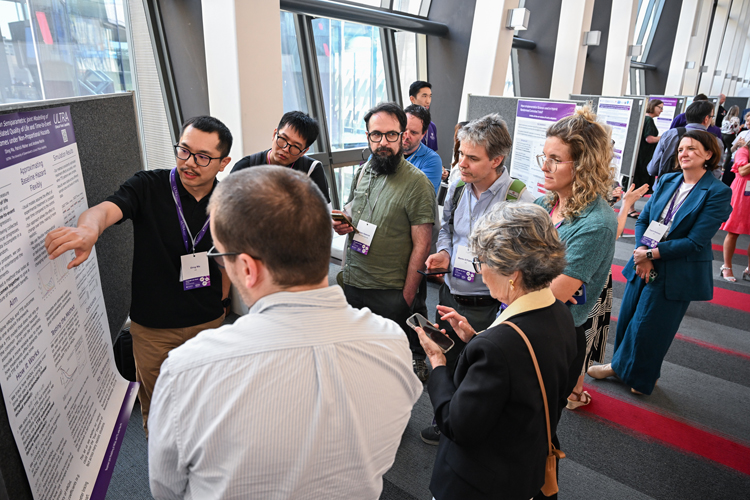
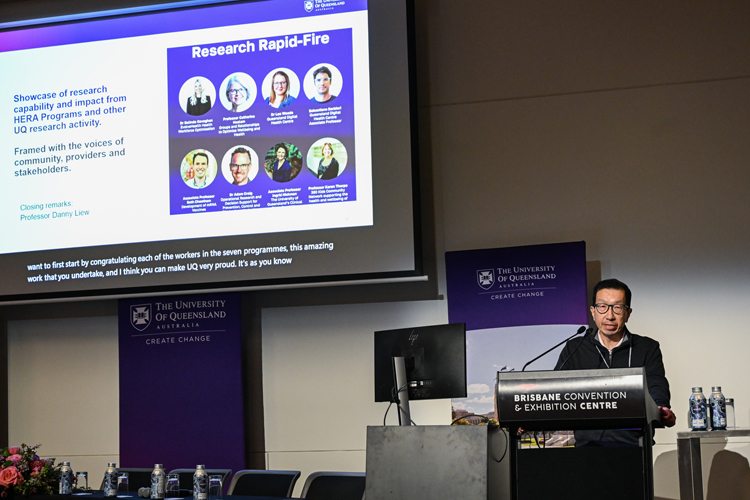

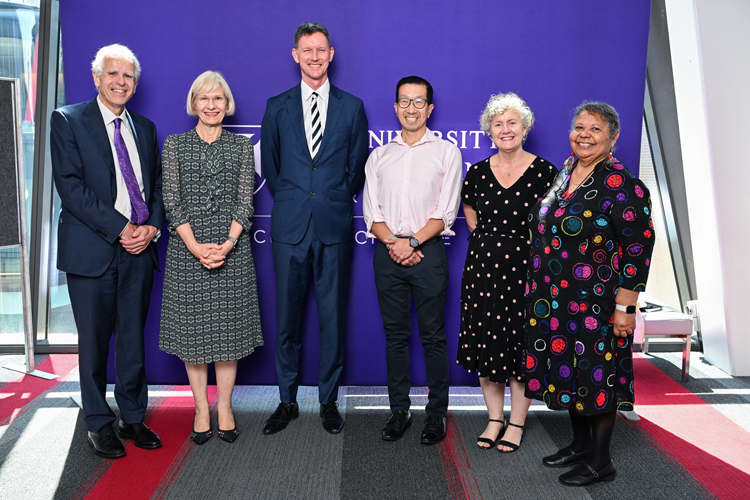
Community-Driven Rural, Regional and Remote Health Research: Showcasing Projects and Collaboration event
On Tuesday 1st October, as part of Research and Innovation Week 2024, we held our annual showcase, with a focus on Rural, Regional and Remote (RRR) Health Research. The event spotlighted the inspirational health research taking place in RRR, with many of the presenting projects supported by the RRR HERA Grant Funding scheme.
We were privileged to hear from three exceptional research projects: Viable Rural Healthcare Models, led by Professor Bruce A Chater, LinkWell, led by Professor Lauren Ball, and developing a long-term research partnership between UQ’s Poche Centre for Indigenous Health and Goondir Health Service, led by Professor Anthony Shakeshaft.
The presentations sparked vibrant discussions among our diverse audience of HERA researchers, RRR partners and consumers, and UQ community members. As part of the event in an interactive session, attendees imagined future newspaper headlines for these projects, bringing to life their potential impact on RRR communities.
We were honoured to have Professor Karen Moritz, Associate Dean (Research) from the Faculty of Medicine, facilitate the event alongside Jessica Taylor, CEO of the Endometriosis Association Qld (QENDO). Jessica shared valuable insights from February's Dalby Consumer Roundtable, bringing a key community perspective to the discussions.
The afternoon proved to be both enriching and inspiring. We're grateful to everyone who contributed to its success and look forward to welcoming you to more exciting HERA events in 2025!
Toowoomba Event - Rural, Regional and Remote Health Research
On Friday 12th July, over 80 regional and rural community groups, health care providers, researchers and industry representatives met with select University of Queensland (UQ) researchers at the Rural, Regional and Remote (RRR) Health Research Showcase in Toowoomba.
Attendees were presented with a suite of customised research projects, designed using feedback gathered from rural community roundtable meetings and consultations that, if accepted, are set to have lasting impacts on the health and wellbeing of not only Queensland communities, but of those living in similar situations and circumstances.
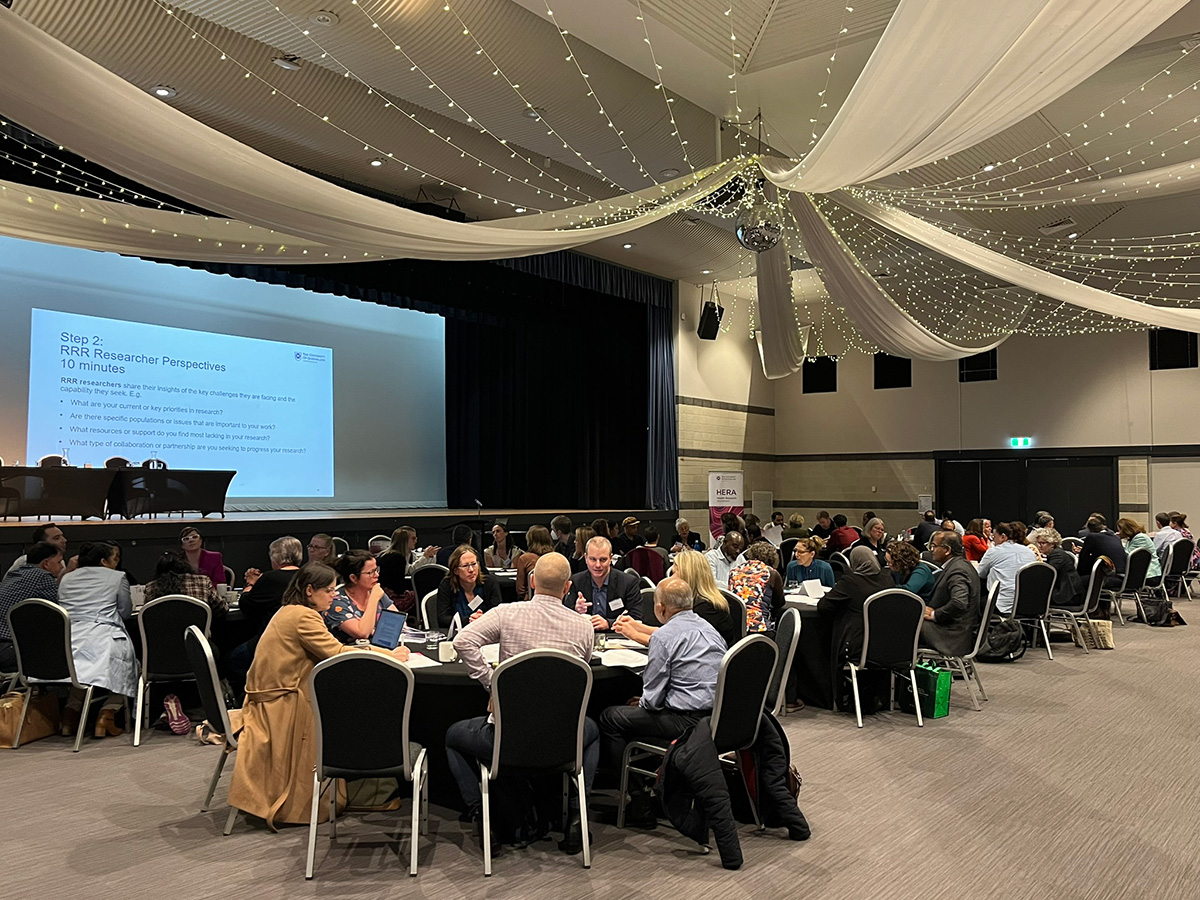
Driven by The University of Queensland through the Health Research Accelerator (HERA) initiative, the RRR Health Research Showcase invited attendees to hear more about and potentially support, partner and collaborate on the 24 research projects, all of which included a focus on the health of rural populations.
Attendees heard from several guest speakers, including the outgoing National Rural Health Commissioner Ruth Stewart and took part in panel discussions, sharing of ideas and world café conversations.
“It was heartwarming to be in a room full of people who are united in their desire to better the health and wellbeing of our communities and I look forward to seeing what their collaborative efforts can achieve,” Professor Moritz said.
This event launched the opening of the UQ Accelerator Grant Scheme seed funding, which is hoped to lead to greater investment in research specifically targeting improved rural health outcomes.
HERA Studio - Rural, Regional and Remote Health Research

On Wednesday 15th May we held the first of our new HERA Studio session aimed to nurture existing collaborative relationships/networks, provide opportunities for transdisciplinary collaboration to mature collaborative projects positioning for research funding opportunities. The Studio took an intentional design approach to overlap all HERA Programs, the strategic funding landscape, and the broader UQ research priorities. Building upon the success of the Regional and Rural Health Research Dalby Roundtable in 2024, this HERA Studio focused on Rural, Regional and Remote Health Research and the identified community research priorities.
The Studio was a big success, demonstrated by strong level of engagement and collaboration in the room. With over 40 attendees representing various HERA programs and researchers from different faculties—including FOM, HABS, Science, and HASS—we saw new connections, an exchange of ideas and the formation of project groups that willl endeavour to catalyse UQ's capability in the Rural, Regional and Remote Health Research space.
Annual HERA Showcase
For more information, please contact the HERA team via hera@research.uq.edu.au.
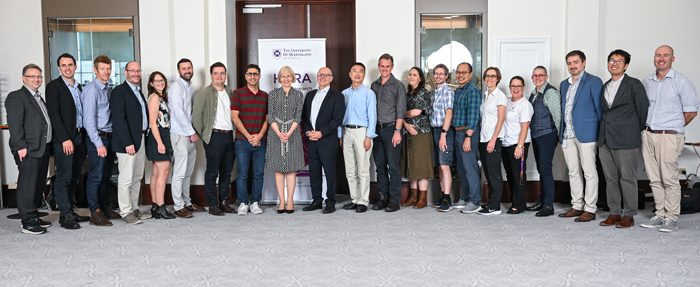
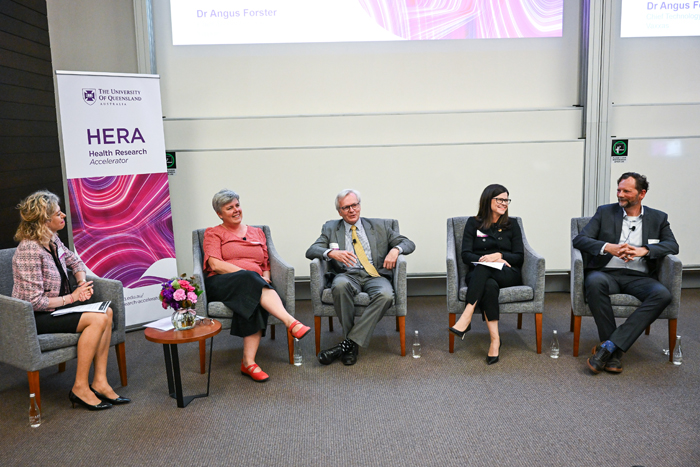
See our research news
UQ to establish world-leading mRNA labQCIF and UQ head to iAwards national finalUQ health project making a difference to First Nations mums and bubsQDHeC leading a ‘digital health revolution’ to tackle chronic diseasesEVOLVE - Landmark report on how to unleash the potential of our health professionsUQ secures global partnership to create homegrown lifesaving vaccinesA patch of protection against Zika virusFunding injection for Strep A vaccine research at UQDemand booms for experimental mRNA from UQ BASEUQ researchers and educators awarded three Eureka Prizes
Forging global partnerships and connectivity is at the heart of UQ’s vision to deliver knowledge leadership for a better world.
HERA provides the scale and intensity needed to make real breakthroughs by connecting people and capabilities from across the UQ with partners in industry, government and other organisations who interact with the health and medical needs of the community.
For more information about any of the HERA programs and potential partnering opportunities, email hera@research.uq.edu.au.
Forming and established partnerships
Over 110 local, national, and international partners are involved in one or more of our HeRA programs. Our partners and stakeholders play a crucial role in ensuring new capabilities enable transformative outcomes and impacts.
Our partners include:
- Australian Clinical Trials Alliance (ACTA)
- Australian Defence Force Malaria and Infectious Diseases Institute (ADFMIDI)
- Australian National University (ANU)
- ACT Education Directorate
- Ballycara
- Bionet-Asia
- Bolton Clarke
- Children’s Health Queensland (CHQ)
- Clinical Excellence Queensland (CEQ)
- Clinical Research & Evidence Synthesis at Travel Medicine Alliance (CRESTMA)
- Coalition for Operational Research on NTDs (COR-NTD), Task Force for Global Health, USA
- CSIRO Australian e-Health Research Centre
- Harvard Humanitarian Initiative (Program on Infectious Diseases and Epidemics
- Health and Wellbeing Queensland (HWQld)
- Health Translation Queensland (HTQ)
- Immunisation Coalition
- James Cook University (JCU) - WHO Collaborating Centre for Vector-borne and Neglected Tropical Diseases
- Lives Lived Well
- Mater Health
- Metro North Health (MNH)
- Metro South Health (MSH)
- Moderna
- National Centre for Immunisation Research & Surveillance (NCIRS)
- QIMR Berghofer
- Queensland Health
- Queensland Office of the Chief Allied Health Officer (OCAHO)
- Queensland Office of the Chief Nursing and Midwifery Officer (OCNMO)
- Queensland Office of the Chief Dental Officer (OCDO)
- Queensland University of Technology (QUT) - Centre for Data Science
- Relationships Australia
- Royal Australian College of General Practitioners (RACGP)
- Southern Queensland Rural Health (SQRH)
- Stryker
- Technovalia
- The Queensland Cyber Infrastructure Foundation (QCIF)
- The Salvation Army
- Vaxxas
2025 successful applications
- 'Early childhood inclusion in focus: Engaging educators in foundational supports to improve health and developmental outcomes for children with disability' led by Dr Laetitia Coles
- 'What Mosquito Saliva Reveals About Disease Transmission: Aedes Mosquito Salivary Biomarkers as an Approach to Dengue and Other Arboviral Disease Risk Monitoring' led by Dr Adam Craig
- 'Developing the Social Footprint: A tool to monitor social connectedness' led by Associate Professor Chelsea Dobbins
- Project led by Dr Rebekah Eden
- 'Identifying digital mental health information needs of women in the perinatal period' led by Dr Glenda Hawley
- 'Bringing the James Lind Alliance Priority Setting Partnership approach to UQ to push the pace on consumer and community-led clinical trials in Australia (JLA-Australia)' led by Dr Bec Jenkinson
- 'Healthy Equity in Randomised Controlled Trials' led by Dr Mark Liu
- 'Self-Optimising saRNA: CRISPR-Based Discovery of Host Restriction Factors in Muscle and Liver Models' led by Dr Rhys Parry
- 'Advancing equitable access to neurodevelopmental services' led by Dr Natasha Reid
- 'Modulating interleukin-21 signalling in B cells for safer Group A Streptococcus vaccines' led by Dr Ismail Sebina
Overview
HERA Collaborate offers a valuable opportunity to advance research collaborations. Successful awardees will receive up to $20,000 to spend in support of activities driving knowledge exchange, consumer involvement, partner engagement, and collaboration building over a 12-month period.
For any queries relating to HERA Collaborate or for further information on HERA, please contact hera@research.uq.edu.au.
Supported activity
HERA Collaborate ensures a broad spectrum of engagement opportunities and fosters impactful collaborations with various stakeholders.
Example activity types include:
- Networking events with partners, national and international collaborators
- Knowledge exchange workshops
- Collaborative activity to co-produce evidence, and/or mechanisms to ensure the uptake of that evidence
- Hosting a seminar/showcase where researchers from different disciplines exchange ideas and collaborate
- Workshops to establish cross disciplinary research partnerships
- Research strategy/planning days
Eligibility criteria
- The project must be in connection to a HERA Program research focus area.
- The project team must include at least one HERA researcher (funded by HERA.)
- The project team must include at least one new UQ collaborator(s) not currently working in the HERA Program team.
- The application must contain a planned approach to submit for a large-scale programmatic grant within 12-months of receipt of funds.
- The project must have the endorsement of the affiliated HERA Program Lead and Head of School/Centre Director.
How to apply
Applications are currently closed, the 2026 round of funding will be announced shortly.
Key Documents
Contact us
Get in touch to learn more about our research.
HERA is supported by a small team staff from the Major Initiatives team in UQ’s Research Office.
Dr Madonna Devaney
Associate Director, Major Initiatives
(07) 3365 4582 m.devaney@uq.edu.au
Ms Georgina Hall
Project Coordinator
